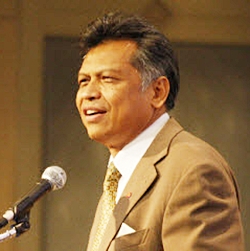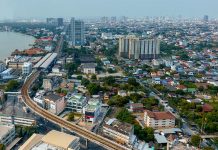Secretary-General Surin Pitsuwan of the Association of Southeast Asian Nations (ASEAN) advised Thailand this week to change its trade and investment models in order to penetrate and invest more in ASEAN markets and bring back revenue to the country.
Speaking on the ‘New Dimension in ASEAN’ at a seminar organized by the Judicial Training Institute for high-ranking Thai officials, Dr Surin said Thai investors should be helped to invest overseas, replacing the current situation where foreign investments are attracted to the country.

Thailand must change itself to start focusing on the industry of innovation, using technology to improve its economic potential such as packaging development or trading online, he noted.
It would take Thailand many years to change and to trade more in ASEAN, as the country has been dependent on low-wage labor and natural resources like its neighbors.
Dr Surin also advised the government to increase its research budget for this, tackle corruption, and have the Board of Investment and the Bank of Thailand adjust to support Thai investors to invest more abroad.
The 10-member ASEAN association has a total trade value of US$2.6 trillion. However, only 25 percent is traded internally, according to Dr Surin.
Meanwhile, Secretary-General Supachai Panitchpakdi of the United Nations Conference on Trade and Development (UNCTAD) spoke on ‘Looking at Thailand in the World Arena’ at the same venue, saying that ASEAN will be the hope and the stimulus of the world economy along with China, Brazil and India, and that ASEAN nations must trade more among them due to the declining purchasing power in the West.
However, clear regulations are needed in ASEAN countries to deal with a higher capital flow coming into the region in order to prevent a bubble economy, Supachai added.
Thailand, in particular, needs good governance along with good public policy planning. The sufficiency economy, as previously addressed by His Majesty King Bhumibol to the Thai people, was suggested by the UNCTAD secretary-general as the best immunity for private companies and policies run by the government.
Supachai said Thailand’s capability to compete ranked 39th last year, out of 142 countries worldwide, preceded by Malaysia at 20th, while Singapore ranked in the top ten along with the United States, Finland, and Sweden.
Despite the fact that Thailand has continuously attracted foreign investments, the nation has five remaining problems – political instability, corruption, unstable government policies, an inefficient bureaucracy, and the inefficient education of the labor sector.




